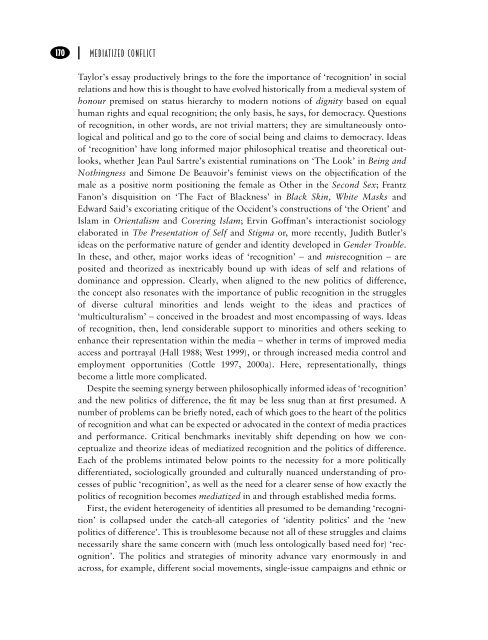Mediatized Conflict
Mediatized Conflict
Mediatized Conflict
You also want an ePaper? Increase the reach of your titles
YUMPU automatically turns print PDFs into web optimized ePapers that Google loves.
170<br />
| MEDIATIZED CONFLICT<br />
Taylor’s essay productively brings to the fore the importance of ‘recognition’ in social<br />
relations and how this is thought to have evolved historically from a medieval system of<br />
honour premised on status hierarchy to modern notions of dignity based on equal<br />
human rights and equal recognition; the only basis, he says, for democracy. Questions<br />
of recognition, in other words, are not trivial matters; they are simultaneously ontological<br />
and political and go to the core of social being and claims to democracy. Ideas<br />
of ‘recognition’ have long informed major philosophical treatise and theoretical outlooks,<br />
whether Jean Paul Sartre’s existential ruminations on ‘The Look’ in Being and<br />
Nothingness and Simone De Beauvoir’s feminist views on the objectification of the<br />
male as a positive norm positioning the female as Other in the Second Sex; Frantz<br />
Fanon’s disquisition on ‘The Fact of Blackness’ in Black Skin, White Masks and<br />
Edward Said’s excoriating critique of the Occident’s constructions of ‘the Orient’ and<br />
Islam in Orientalism and Covering Islam; Ervin Goffman’s interactionist sociology<br />
elaborated in The Presentation of Self and Stigma or, more recently, Judith Butler’s<br />
ideas on the performative nature of gender and identity developed in Gender Trouble.<br />
In these, and other, major works ideas of ‘recognition’ – and misrecognition – are<br />
posited and theorized as inextricably bound up with ideas of self and relations of<br />
dominance and oppression. Clearly, when aligned to the new politics of difference,<br />
the concept also resonates with the importance of public recognition in the struggles<br />
of diverse cultural minorities and lends weight to the ideas and practices of<br />
‘multiculturalism’ – conceived in the broadest and most encompassing of ways. Ideas<br />
of recognition, then, lend considerable support to minorities and others seeking to<br />
enhance their representation within the media – whether in terms of improved media<br />
access and portrayal (Hall 1988; West 1999), or through increased media control and<br />
employment opportunities (Cottle 1997, 2000a). Here, representationally, things<br />
become a little more complicated.<br />
Despite the seeming synergy between philosophically informed ideas of ‘recognition’<br />
and the new politics of difference, the fit may be less snug than at first presumed. A<br />
number of problems can be briefly noted, each of which goes to the heart of the politics<br />
of recognition and what can be expected or advocated in the context of media practices<br />
and performance. Critical benchmarks inevitably shift depending on how we conceptualize<br />
and theorize ideas of mediatized recognition and the politics of difference.<br />
Each of the problems intimated below points to the necessity for a more politically<br />
differentiated, sociologically grounded and culturally nuanced understanding of processes<br />
of public ‘recognition’, as well as the need for a clearer sense of how exactly the<br />
politics of recognition becomes mediatized in and through established media forms.<br />
First, the evident heterogeneity of identities all presumed to be demanding ‘recognition’<br />
is collapsed under the catch-all categories of ‘identity politics’ and the ‘new<br />
politics of difference’. This is troublesome because not all of these struggles and claims<br />
necessarily share the same concern with (much less ontologically based need for) ‘recognition’.<br />
The politics and strategies of minority advance vary enormously in and<br />
across, for example, different social movements, single-issue campaigns and ethnic or









